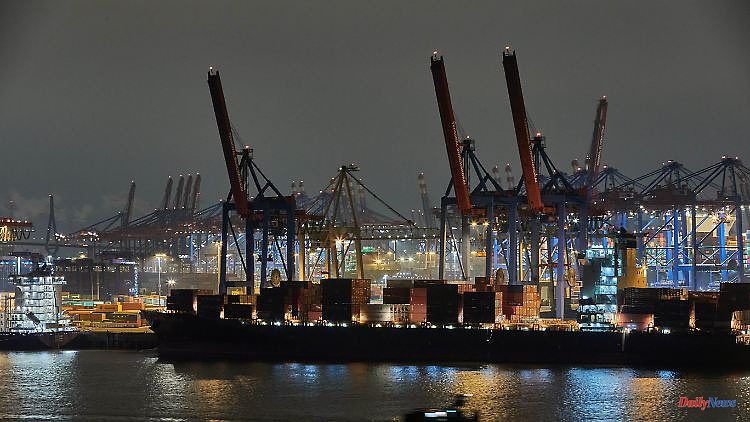Since the USA launched their massive investment package for green industry, Germany and the EU have been threatened with a massive exodus of future technologies. To counteract this, Commission President Ursula von der Leyen has announced the Green New Industrial Deal - a multi-billion investment package to keep green industry in Europe. But that's not enough, says Manfred Fischedick. The President of the Wuppertal Institute sees the problem in the "infinitely complex regulations" in the EU and in Germany.
ntv.de: Ursula von der Leyen presented the Green New Industrial Deal yesterday. Is this the beginning of the end of green industry migration to the US?
Manfred Fischedick: We're not that far yet. But first of all it is good that the EU has reacted with this Green New Industrial Deal. The pressure was incredible to counter both the US Inflation Reduction Act (IRA) and the Chinese Investment Plan. These are tougher competitive conditions. It is a good idea not to simply let the markets of the future pass you by.
What does the Inflation Reduction Act have to do with future markets?
Actually, the IRA has the wrong name. Ultimately, it is a green investment program. It promotes green technologies such as renewable energies or hydrogen technologies that are necessary for decarbonization. This is a milestone for the Americans - but it is also urgently needed in order to even begin to achieve the climate protection goals.
Why is the IRA such a big threat to Europe?
The IRA is so successful because it is so simple. Extensive tax breaks and subsidies are granted for green technologies and production. This makes the company immediately capable of action and thus marketable. In the European Union, but also in Germany, there are highly complex regulations and very long planning and approval times.
So it's just cheaper and easier to build a site for future technologies in the US?
Yes, the pragmatic approach is impressive. However, the protectionism implemented in the IRA is a key incentive. In order to be able to count on advantages on the American market, the vast majority of the product must be manufactured in the USA. That's a sharp sword in a market as big as the US.
Is the Green New Industrial Deal the right answer to this competitive situation?
First of all, the announcement of the European response has great symbolism. However, it is now important to take real action: to improve the framework conditions, to accelerate the approval procedures, to make the support programs more pragmatic and faster and to give the member countries more freedom to implement targeted measures for their industries. This is at least as important as spending additional billions now.
Has US President Joe Biden used the IRA to force the EU to accelerate the expansion of green technologies?
The USA and China are increasing the pressure in the kettle enormously. Many companies are toying with the idea of relocating new production facilities to the USA because of the attractive general conditions. You have to react, of course, so that you suddenly don't just find yourself as a second or third choice on the world's major markets of the future.
Doesn't this also result in a wasteful subsidy race?
In view of the immense pressure to act for climate protection, it is good news that such programs exist at all. If the US, China and Europe "push each other on", more billions will flow into the necessary transformation process. In this sense, the competition stimulates the implementation dynamics and has a role model function.
But?
If you acted in a more coordinated way, if you joined forces and reduced protectionism, there is a high probability that much more could be achieved. For example, the EU and the US could jointly invest in the development of a global hydrogen economy or work even more closely together on the development of new technologies, such as for separating carbon dioxide from the atmosphere. But once again: the investments in the transformation path that are now being triggered are a milestone that we definitely need.
Doesn't a conversion to green or sustainable production make sense anyway from a market perspective? Why do we need a subsidy race at all?
The high electricity prices are helping to push renewable energies in the area of electricity generation. This makes them even more economical than they already were. But it is not just about electricity, but also about the heat transition and the conversion of industrial processes. The steering effect of oil and gas prices is not sufficient for this to take the big step towards transformation.
Why not?
For example, let's look at the steel industry. If the production of coking coal is to be switched to hydrogen, this entails considerable additional costs - even though coking coal has become more expensive. For companies that are in global competition, this is simply not feasible without state support. At some point it would be economically worthwhile to make the change. But we cannot afford this delay in view of the challenges of climate protection and security of supply. It is therefore exactly right to turn the lever now with target-oriented support measures.
If an LNG terminal can be built in a few months but a wind farm takes seven years to build, isn't the priority misplaced?
The story with the LNG terminals was of course a very special situation: Russia suddenly turned off the gas tap, the next winter was just around the corner and the storage facilities were not sufficiently filled. This gap had to be closed quickly. This pressure situation meant that you had to turn a blind eye in many places. It should also not be forgotten that the plans for the LNG sites were not fundamentally new - they did not start from scratch, but were able to fall back on what had already been extensively thought through beforehand.
Wind turbine expansion is also not entirely new.
Yes, that's right. But the priorities have actually not been set in the right direction in recent years. With the federal government's decision last year to grant the status of "outstanding public interest" to renewable energies, the course has now been set differently. But there is also the fact that we have set up an approval system over the past few years - it is pure madness. There are so many legal points of attack and pitfalls. Once one process is complete, the next one comes and, figuratively speaking, you start again from scratch. This quickly adds up to seven years of approval time. The federal government is working to change that. The Green New Industrial Deal can provide significant support here. The capacities of the approval authorities must be expanded and the procedures simplified.
How big is the risk of a race between the 27 member states?
We have to be very careful here. If the member states can determine the approval procedures, tax breaks and regulatory facilitations themselves, this could become dangerous for the internal relationship. Economics Minister Robert Habeck speaks of a transformative supply policy that he wants to implement in Germany. I think that is consistent and correct. But not all member states can afford subsidies in the field of renewable energies or for the introduction of hydrogen. Germany can afford it, maybe France. But not the small states. Appropriate measures must be taken for this.
The so-called sovereignty fund was announced for this purpose.
At first glance, that sounds good. But neither the extent nor the details are known yet. The EU Commission is talking about the remaining money from the Corona recovery fund that could help Poland, Hungary, the Czech Republic, whoever, with the green transformation. But how much is involved and according to which rules they should be used is still very unclear.
Clara Suchy spoke to Manfred Fischedick












